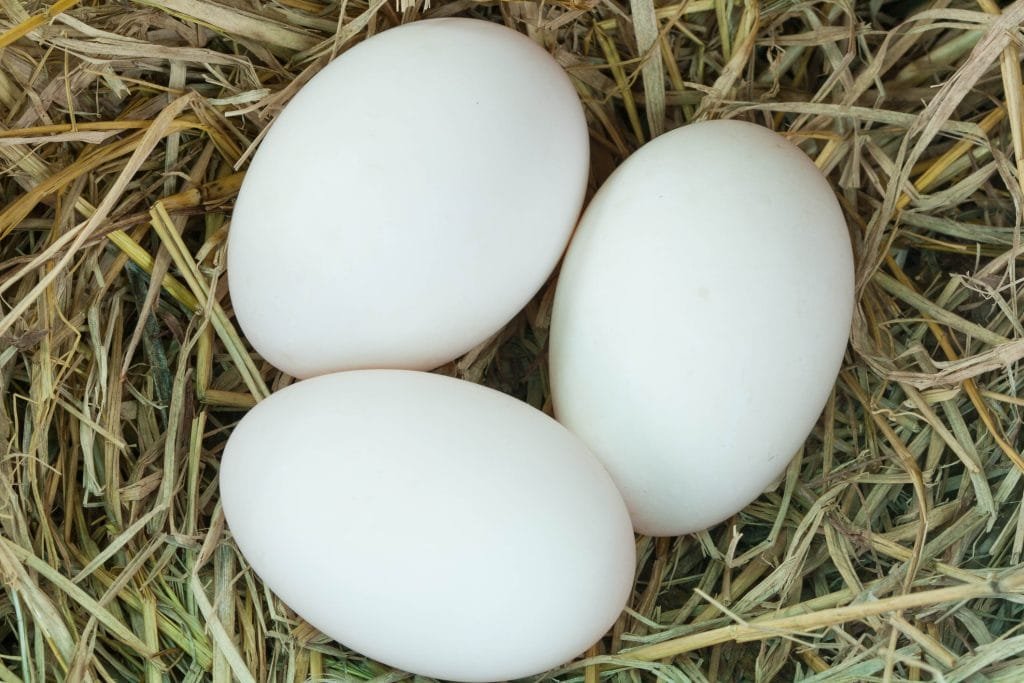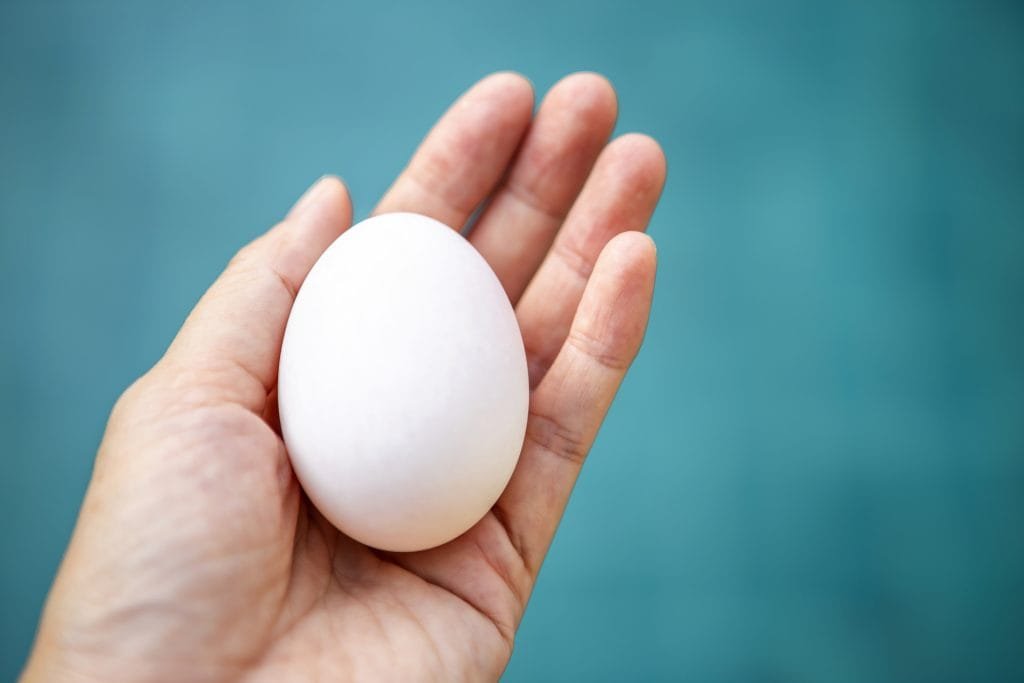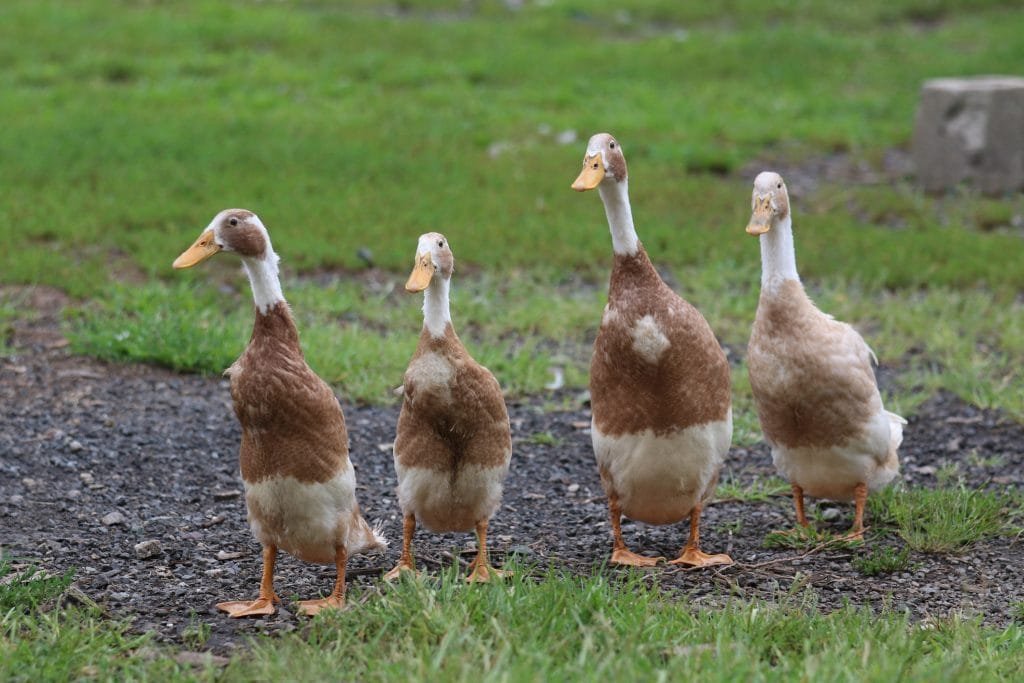This post contains affiliate links.
Ducks are a common addition to a homestead or backyard garden. Many breeds are very friendly and are good egg producers. Some people consider getting ducks instead of chickens but are unsure if they are harder to raise for eggs.
Raising ducks for eggs is straightforward. While certain duck breeds are more proficient at laying eggs, most duck hens lay well into their seventh year of life. In addition, these fouls barely require human intervention and maximize egg-laying production if you allow them to roam freely.
While chicken eggs are the typical go-to for breakfast and baking, duck eggs produce creamier and fluffier eggs in the morning! In this article you will learn more about reasons to look into owning ducks for egg production − you may even make a couple of bucks!

Is It Challenging To Raise Ducks For Eggs?
Raising ducks is not only practical but equally entertaining! They are very social and affectionate animals. If you are wondering how ducks show affection check out my article, Does your Duck Wag its tail? 4 Signs of Affection.
Getting your ducks to lay large creamy eggs is a simple affair − however, like chickens, several breeds are more adept or proficient at laying eggs than others. More so, on average, ducks produce more eggs than chickens annually.
Duck eggs are significantly larger and harder than chicken eggs. However, unlike chicken hens, duck hens tend to lay well into their seventh to the ninth year of life, making them highly sustainable livestock for a homestead.
Believe it or not, the simplest way to yield maximum duck egg production is by allowing your ducks to range freely. These easy keepers are independent poultry fowls that barely rely on human intervention when they can roam freely.
Roaming around the homestead allows the ducks to consume as much of their natural diet as possible. The ample protein that your “pest control squad” enjoys while removing pests and bugs helps them produce rich eggs year-round.
Note that ducks are extremely routine-driven! If there is any deviation in their routine, be it feeding or allowing them to roam freely, they are sure to let you know with loud quacking. This can make them both easier and harder to raise. It is easier since you can set up a schedule for your ducks but harder since they are less adaptable when you have a change of plans. Learn more about feeding your ducks in my article, How Often To Feed Ducks?
Like with chickens, you do not need a male duck (drake) if you are going to collect eggs for eating; you only need a drake if you plan to have fuzzy ducklings roaming around your homestead within a couple of months.
Ducklings are adorable but can be pretty noisy. If you need help with your loud ducklings check out my article, Why Won’t My Duckling Stop Quacking.
Another significant advantage of raising and keeping ducks for eggs is the easy-going and docile nature of drakes. As a result, you won’t have to deal with the worry of vicious attacks by a rowdy rooster.
As a risk, domesticated ducks can’t fly well, making them highly vulnerable to predators. While chickens are also at risk, they can fly high enough to lift them into the trees.
When Do Ducks Start Laying Eggs?
Ducks generally reach a mature enough age to start laying eggs at 4 to 7 months or between 16 to 28 weeks. In addition, they should reach a laying rate of around 90% after five weeks of their onset laying date.
While your smaller breeds, like Bantams and Runners, tend to lay as early as four months old, the heavier species like the Muscovies and Pekins take a little longer to start laying.
Ducks generally only start laying at spring − the beginning of their breeding season in the wild. So, if your ducks reach 28 weeks old and still do not lay eggs, you may want to wait for spring to emerge.
Note that if you plan to use artificial lighting to extend the length of wintery days, then your ducks may be more likely to start laying when they reach maturity instead of waiting for the onset of the breeding season.
When And How Often Should I Collect Duck Eggs?
Duck hens generally lay one egg per day. You’ll notice that they rarely become broody and will consistently lay eggs when you collect them daily.
Ducks primarily lay their eggs during the evening or before sunrise. Therefore, you’ll want to gather the duck eggs first thing in the morning to prevent them from becoming dirty and minimize breakages.
If your ducks are still laying on the nest while collecting eggs, make another trip in about two hours; it’s best to allow the duck hens to stay on the nest.

10 Benefits Of Raising Ducks For Eggs
If you aren’t entirely convinced about the simplicity of raising ducks for eggs, the benefits are sure to change your mind. Here are the top ten benefits egg-laying ducks:
- Duck eggs contain high fat and protein percentages, low water count, and a higher yolk to white ratio, making them excellent for baking and cooking. In addition, you will note that duck eggs make baked goodies extra light and fluffy!
- Duck eggs contain a higher percentage of nutritional benefits than chicken eggs; this may be because of the heftier white content that provides ample protein.
- Duck eggs have thicker shells and membranes, making the shelf life of duck eggs far longer than chicken eggs. In addition, due to the more rigid shells, duck eggs are far less likely to break accidentally.
- Ducks are rarely broody as quickly as chicken hens when they lay a clutch of eggs.
- Ducks typically grow at a more rapid pace than chickens and often they start to lay eggs earlier than chickens − as an estimation, duck hens start laying at four to five months old.
- Duck hens are fully capable of producing eggs year-round. In comparison, many chickens stop laying eggs during the coldest months of the year.
- Quality egg-laying duck breeds lay between 200 and 350 large eggs per year.
- Most ducks are more robust and hardier than chickens. Ducks rarely contract heat exhaustion or frostbite like chickens, and their more robust immune systems protect them from most common diseases.
- Ducks prefer roaming around outside, leaving their coops cleaner and reducing the spread of fungus- or bacteria-borne diseases during the winter.
- Ducks are more budget-friendly. You can sell duck eggs for higher prices than chicken eggs. More so, ducks have a lower feed conversion ratio than chickens, which means they need less feed to produce eggs than chickens.
Are Duck Eggs Tasty?
Duck eggs are around thirty percent larger than average-sized chicken eggs.
Duck eggs contain less water and a high fat and protein content, giving them a rich and creamy taste. Highly prized by pastry chefs, these eggs produce lighter bread and cookies, fluffier cakes, and taller meringues and souffles.
While the taste of an egg depends on the bird’s overall diet, duck eggs tend to be “eggy” and more flavorful than chicken eggs. Duck eggs are great for fried, scrambled, poached, or over easy breakfast eggs.
Are Duck Eggs Healthy?
Duck eggs are a fantastic source of nutrition; their dark yellow yolks indicate that they contain higher quantities of Omega-3 fatty acids and Vitamin A than chicken eggs. In addition, duck eggs typically provide more concentrated sources of Vitamin D, choline, selenium, folate, and iron.
Duck eggs are low in calories − they only contain six percent of your daily value of calories. However, these nutrient-dense eggs provide up to eighteen percent of your daily protein, offering larger protein quantities than chicken eggs (even taking the size difference into account).
Due to the high protein content, duck eggs can help build lean muscle, support recovery after exercise or injury, and maintain a healthy weight.
You can safely eat one duck egg every day. However, keep in mind that they contain higher cholesterol than chicken eggs, so you do not want to overdo it.

How Many Ducks Do I Need?
Ducks are incredibly social animals, so you’ll want to consider raising at least three, but preferably five to six ducks together. A bored duck can become quite frustrated and depressed if alone, stopping or reducing the number of eggs that it lays.
In terms of drakes versus duck hens, an ideal flock ratio includes three females without a male or around four or five females with one male.
Again, note that you do not need a drake for your duck hens to lay eggs for consumption. However, the eggs won’t ever hatch into ducklings without a drake to state the obvious.
If you aren’t sure how many ducks to get check out my article, How Many Ducks Should I Get? Things to Consider
What Are The Best Duck Breeds For Egg Laying?
With hundreds of domestic duck breeds available, finding the perfect breed for your homestead can be pretty challenging if you lack prior experience. So, in addition to prolifically popping out eggs, we sought out the top six breeds that are true homesteading breeds and excellent free-rangers.
Here are the top duck breeds that will consistently lay top-grade eggs throughout the year (including winter).
Khaki Campbell
The Khaki Campbell is a mild-mannered and probably the most popular duck breed in the United States. This breed is well known for its famous khaki-colored feathers and prolific egg-laying tendencies.
Khaki Campbells are relatively quiet and an excellent free-ranging breed, making them fantastic additions to your homestead. The hens aren’t only great layers; they are diligent sitters too.
Pekins
Pekins are another trendy breed for farmers and homesteaders thanks to their high trainability and dual-purpose.
Pekin ducks are hardy and intelligent breeds with an exceptional consistency in laying eggs year-round. However, note that Pekins are poor sitters. What’s interesting, though, is that Pekin hens are prone to rolling their eggs into a nest even though they lack the desire to sit on them. More so, a dominant hen tends to steal other hens’ eggs, pushing them to a surprising distance!
Pekins are hardy to a wide range of climates and most common poultry parasites and diseases. While Pekins are mostly kept as farm pets and eggs, many keepers choose this breed for their dual purpose of laying eggs and providing large meat portions.
Ancona
The Ancona is a gorgeous, overly friendly, dual-purpose bird highly regarded for its excellent quality of eggs and meat. While less popular than the Khaki Campbell and Pekin, homesteaders who own Ancona rave about their excellent egg production.
Ancona laying hens thrive best in free-ranging environments, foraging like pros even as mere ducklings.
Indian Runners
Indian Runners are intriguing ducks that stand distinctly erect, resembling penguins. This duck breed ranges in more colors than the other domesticated duck breeds; they are available in white, black, blue, chocolate, light brown, dark brown, and a brownish shade of green.
Indian Runner lay consistently for four to five years before the number of eggs diminishes.
Indian Runners are excellent foragers and hardy to a vast array of climates; it’s best to allow them to range freely in a husbandry style.
Welsh Harlequin
Welsh Harlequin hens are well known for their docile nature towards humans and their excellent egg production. In addition, they produce non-greasy, lean meat with a robust flavor.
Welsh Harlequins are a hardy duck breed that thrives in most climates; they aren’t susceptible to heat, cold, or profound changes in weather conditions.
Note that although Welsh Harlequin hens are typically docile, the drakes tend to have an avid desire to procreate; you’ll only need one male to service an entire flock of hens.
Magpies
Magpies are far less common than Khaki Campbell, Pekins, or Indian Runners. These ducks are pretty highly strung and less social with their keepers than other breeds. However, they are pretty affordable and reticent, making them sought after by homesteaders with a small plot.
Magpies aren’t always broody hens, but they are far better sitters and mommas than Pekins. Even better, it takes around eighteen days for Magpie eggs to hatch − almost a whole week shorter than other breeds.
Comparing The Top Duck Breeds For Laying Eggs
Here’s a simple comparison to make your choice of duck breed straightforward. Refer to the section mentioned above for a short description of each breed.
| DUCK BREED | AVERAGE LIFE SPAN | AVERAGE LAYING AGE | AVERAGE ANNUAL EGG PRODUCTION | EGG COLOR AND SIZE |
| Khaki Campbell | 8 to 10 years old | 5 to 7 months | 300 to 340 eggs | Creamy Extra-large |
| Pekins | 8 to 12 years old | 5 to 6 months | 200 to 300 eggs | White Extra-large |
| Ancona | 8 to 10 years old | 5 to 7 months | 210 to 280 eggs | White, cream, blue Large |
| Indian Runners | 8 to 12 years old | 4 to 6 months | 300 to 350 eggs | White or blue Jumbo |
| Welsh Harlequin | 8 to 10 years old | 5 to 7 months | 250 and 300 eggs | Whitish Large |
| Magpies | 8 to 12 years old | 6 to 7 months | 220 to 290 eggs | White Large |
What Do You Need To Raise Ducks?
Keeping ducks is pretty straightforward as they are relatively low maintenance. Note that you can raise your ducks and chickens together without building a second coop.
Ducks will, however, need more water than chickens, so provide a second waterer. But then, contrary to popular belief, your ducks do not need a pond to swim in; they are pretty content with a splash pool.
Most ducks are extremely cold-hardy, preferring to stay outdoors. Therefore, you do not need to elaborate on their housing; a small shed is a perfect option to ensure a safe, predator-proof space.
Note that ducks do not roost on perches or lay in nesting boxes like chickens; instead, ducks prefer sleeping and laying their eggs on straw bedding on the floor. The biggest downside to ducks is that they are pretty messy fowls. So, you’ll need to change their bedding often.
If you’re raising ducklings, they require additional heat until they grow their feathers. More so, you need to feed them chick feed for the first two weeks. Then, the chicken grower feeds until they are ready to lay eggs. Lastly, provide layer feed once the ducks are mature enough to lay eggs.
- Unique and complete formula - Balanced formula with all the specific nutrients ducklings...
- Niacin - Includes at least 60 ppm (mg/kg) niacin to meet ducklings’ higher niacin...
- 19% protein - Specific protein levels to support duck growth
Most importantly, ducks are excellent foragers that enjoy roaming your homestead, scouring for bugs, weeds, slugs, grubs, toads, and earthworms.
Raising a small flock of ducks is extremely rewarding and enjoyable. If you spend lots of time with your ducks, they typically become friendly and affectionate pets who lay delicious fresh eggs for breakfast.
Final Thoughts
Caring for ducks is straightforward and extremely fun. They are no harder to raise than chickens and many actually think they are easier to raise.
Better yet, your pet duck hens will gift you with an ample supply of eggs year-round. My all-time favorite duck breed is the Indian Runner, which resembles a penguin; however, the other five breeds mentioned above are equally beautiful and great for laying eggs.

